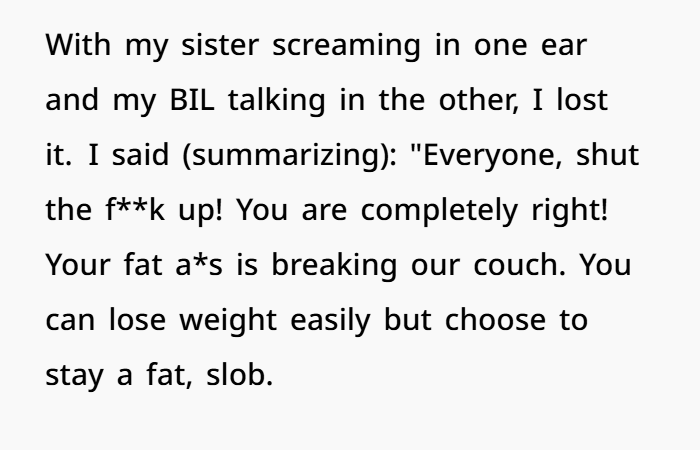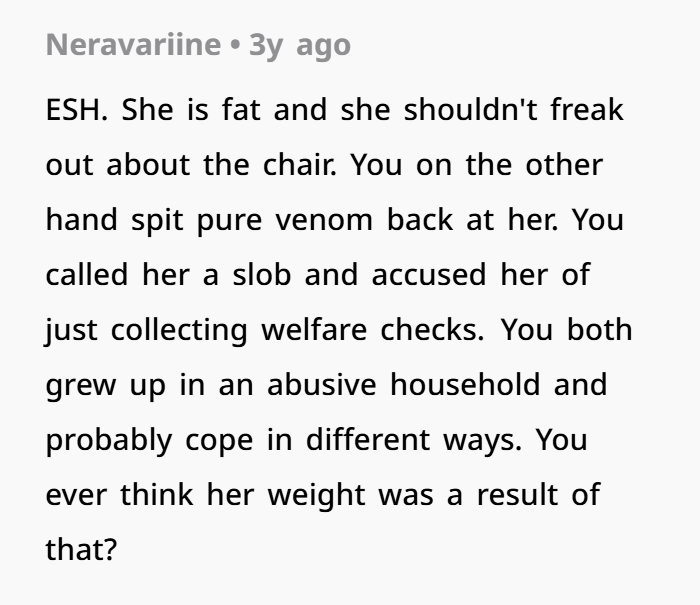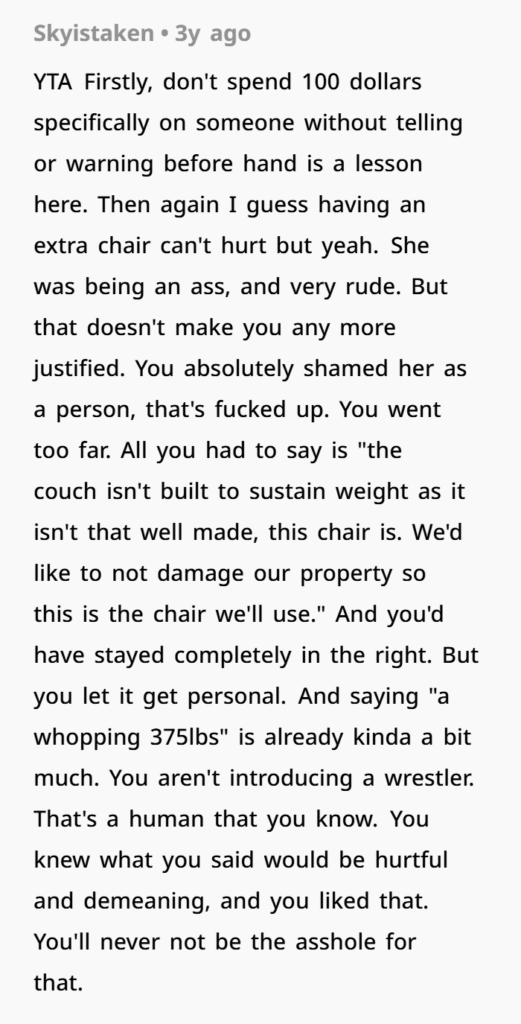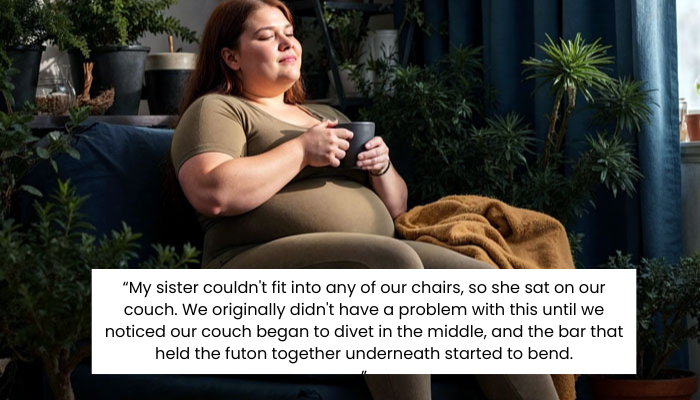She Broke My Couch So I Told Her She’s Too Heavy. AITA for Saying It Out Loud?
The original post tells the story of someone who came from an incredibly rough background, worked hard to build a stable life, and finally started enjoying the small comforts that come with independence — like furnishing a small apartment, hosting game nights, and having their own space. The issue? Their sister, who weighs 375 lbs, has been damaging their donated couch during Dungeons & Dragons sessions, and when OP and their boyfriend tried to handle it delicately by buying her a heavy-duty chair, she exploded. Then, with her husband (OP’s BIL) also chiming in, things spiraled, and OP finally lost it — calling her out, harshly, for being overweight and blaming her for damaging the couch.
Now, OP is left wondering: Was it fair to call out her weight when all they were trying to do was protect their furniture? Or did they go too far in how they said it?
The comments have been divided — some say the sister’s reaction was out of line, others believe OP’s rant crossed a line. Either way, the deeper issues around boundaries, financial stress, and body sensitivity are what make this story resonate beyond just a broken couch.
Protecting something that’s yours can bring out a side of you that even you didn’t know was hiding under the surface

The author grew up in a toxic home, moved out at 17, and struggled financially while slowly building a stable life with her boyfriend










Alright, let’s break this down — and not just the couch.
This story actually taps into some super complicated but very real issues: personal responsibility, body weight conversations, economic struggles, and setting boundaries with family. And the couch? Yeah, it’s not really about the couch. It’s about respect, unspoken tensions, and that one final straw that cracks the whole situation wide open.
Let’s start with the elephant in the room — literally and figuratively: talking about weight.
1. Weight Sensitivity vs. Furniture Durability
This was never a “you’re fat, lose weight” kind of issue until the couch started giving in. OP and their boyfriend weren’t throwing insults — they were trying to solve a problem. Heavy-duty furniture for plus-size people isn’t offensive. It’s practical.
In fact, chairs designed for people over 300 lbs are a legit thing. They’re called bariatric furniture and are often used in hospitals, public spaces, and private homes. These chairs are built to prevent accidents and provide proper support. Is that fat-shaming? Nope. It’s safety and comfort.
The sister’s anger came from interpreting the solution as an insult, not from the action itself. This is common when someone is insecure or defensive. According to clinical psychologist Dr. Ramani Durvasula, people who struggle with body image can easily see helpful suggestions as personal attacks — even if the intent was pure.

2. When Being “Nice” Doesn’t Work Anymore
Let’s be real — OP tried. They didn’t point fingers. They just bought a chair. In their eyes, it was an investment to save their already fragile couch and avoid further issues.
But when someone flips out over a gesture like that, and then their partner starts blaming you for their meltdown, it’s like, how are we the bad guys?
This is what therapists call emotional triangulation — where a third party (BIL) inserts themselves into the conflict to guilt you or twist the narrative. In this case, the BIL saying “you got the couch for free, just replace it” shows a total lack of respect for how hard OP and their boyfriend worked to build up their home. This wasn’t a millionaire tossing a couch out — this was two people who grew up with nothing scraping by and treating their few belongings with care.
3. Why It’s Hard to Talk About Weight — Even When It’s Relevant
The truth is, weight has become so taboo in family dynamics that people are terrified to talk about it — even when it’s causing real physical problems, like breaking furniture or impacting health.
According to obesity researcher Dr. Yoni Freedhoff, the issue isn’t about appearance but functionality. “Weight becomes dangerous when it interferes with someone’s day-to-day life and they’re unwilling to acknowledge that.” That’s exactly what happened here. The couch damage wasn’t personal. It was physics.
But when you try to dance around the topic and still get accused of being mean? That’s where a lot of people snap.
OP admitted they went too far in the rant. But the frustration was clearly built over time. Living poor, saving every penny, then watching your only couch get crushed because someone refuses to acknowledge basic physical realities? Yeah, it’ll make anyone pop off.

4. Is It Fatphobia… Or Just Consequence?
Here’s the line that gets blurry: was OP being cruel, or just finally saying what no one else would?
Let’s be honest — the rant was harsh. Saying “this is a problem you can literally run from” and calling someone a “fat slob” definitely crosses the “tough love” line. It’s the kind of thing that might feel justified in the moment but causes real emotional damage after.
That said, sometimes the only way people hear you is when the words come sharp. That doesn’t mean it was kind, but it’s human. People under stress don’t always speak with grace. They speak with frustration. And this situation was years of pain, poverty, and pressure boiling over.
Tip: If you’re ever dealing with this kind of situation again, consider using nonviolent communication techniques — it’s a great tool that helps express truth without blame. (Keyword: conflict resolution with family)
5. Can You Be “Not the A-Hole” But Still Kinda Be an A-Hole?
This is what makes this story so hard to judge. OP didn’t start with malice. They tried to prevent damage. The rant came after multiple warnings, false blame from the BIL, and being screamed at.
It’s possible to be right in what you say, but wrong in how you say it. The sister should definitely apologize for breaking their property and then making them feel guilty. But OP might also consider softening the language next time.
Boundaries don’t need to be screamed — but sometimes, people only listen when they are.
Netizens were divided on the situation with some insisting that the author wasn’t wrong for protecting her furniture, while others criticized her for her harsh words









